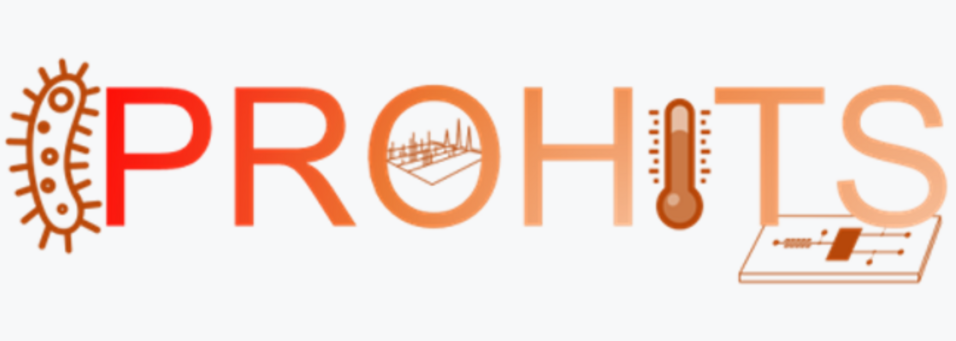MARIE SKŁODOWSKA-CURIE ACTIONS
HORIZON-MSCA-2022-DN-01
Apply for one to three of the ten available international PhD positions in the PROHITS doctoral network project. This collaborative project between eleven participant organisations from six countries, including both academia and biotech industry, will offer a comprehensive and cross-disciplinary structured curriculum for doctoral students. 10 fellowships (for DCs, Doctoral Candidates) are available in the areas of microfluidics, mass spectrometry, synthetic biology, bioinformatics and genome modelling.
These positions are provided by PROHITS, a European MSCA Doctoral Network project. The interdisciplinary research aim of PROHITS is the integration of experimental and computational approaches that can resolve the proteome of prokaryotes at single cell level, and at a range of temperatures, in order to improve our understanding of thermophile biology and to guide the optimized design of cell factories.
The project will involve the development of microfluidics, mass spectrometry (MS) and associated bioinformatics to handle single prokaryotic cells, as well as MS-based thermal proteome profiling (TPP) to study the thermal response of the proteome of thermophiles. These data will be used to understand the in vivo thermal stability of proteins, and create genome-scale models of thermophiles to optimize them as cell factories.
- DC1: Prediction and interpretation of thermophilic proteins (Computational, VUB, Brussels, Belgium)
- DC2: Thermophilic prokaryotes cultivation and biology (Experimental, VUB, Brussels, Belgium)
- DC3: Single prokaryote cell MS data analysis (Computational, VIB, Gent, Belgium)
- DC4: MS Thermal Proteome Profiling (TPP) data analysis/visualisation (Computational, University of Bergen, Bergen, Norway)
- DC5: Genome scale network models (Computational, University Vienna, Vienna, Austria)
- DC6: Application of TPP to thermophiles (Experimental, CNRS, Strasbourg, France)
- DC7: MS TPP method development (Experimental, CNRS, Strasbourg, France)
- DC8: Optimisation of cell factories (Experimental, NovoArc, Vienna, Austria)
- DC9: Microfluidics cell separation and MS integration (Experimental, Cellenion, Lyon, France)
- DC10: Optimisation of sample preparation and examination of the thermal response of selected thermophilic organisms(Experimental, University of Debrecen, Debrecen, Hungary)
Candidates must be in possession of a Master’s Degree (or equivalent) in chemistry, biochemistry, physical, life or biomedical sciences, or computational or mathematical sciences as requested in the skills and experience of the respective DC description, enabling them to enroll in a Doctoral Programme by the recruitment date.
The candidate must not have resided or carried her/his main activity (studies, work, etc.) at the country of recruitment for more than 12 months in the 36 months immediately prior to the recruitment date. The candidate must not hold a Doctoral degree by the time of recruitment date (i.e. by the start of the contract).
You can submit your application here
Genome-scale network models in Vienna
In the PhD project at the University of Vienna, you will develop, reconstruct, and curate (enzyme-constraint) genome-scale metabolic models (GEMs) of thermophilic prokaryotes for use as microbial cell factories. In close collaboration with experimental partners, you will integrate multi-omics data obtained into the GEMs and computationally derive a holistic understanding of the thermal response of the proteome of thermophiles.
Equipped with this knowledge you will:
- improve our understanding of host physiology and metabolism under different cultivation conditions; and
- computationally design, predict and optimize industrial process conditions to improve product titre, rate, and yield (TRY) of a microbial cell factory under extreme conditions.
You will be based in the group of Jürgen Zanghellini at the Department of Analytical Chemistry and intensively collaborate with experimental partners at NovoArc in Vienna, a company that develops and manufactures unique lipids derived from the extremophilic Archaeon Sulfolobus acidocaldarius for applications in drug encapsulation and delivery. In addition, you will spend a 3-month secondment at the Vrije Universiteit Brussels (VUB, Brussels) linking single cell protein level data to the developed models.
The project is part of a computational/experimental EU MSCA-DN project with a total of 10 PhD students, and is highly interdisciplinary. Your focus will be on the computational part. Thus, good coding skills (preferentially Python) are essential. Knowledge of machine learning/artificial intelligence as well as basic biochemical knowledge is desirable. Skills in the field of -omics as well as background knowledge on archaeal biology is a bonus. Candidates must be motivated to learn about all disciplines relevant to the project.

